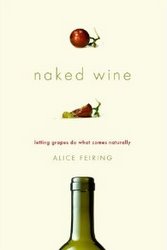|
Wine
book reviews
Naked
wine: letting grapes do what comes naturally
By Alice
Feiring (Da Capo, 2011)
 One
of the most important wine books in recent years, this is Alice
Feiring's narrative of her quest to explore the roots of natural
wine—and to make some of her own, too. One
of the most important wine books in recent years, this is Alice
Feiring's narrative of her quest to explore the roots of natural
wine—and to make some of her own, too.
Natural wine
is a hot topic of late. The use of the term ‘natural’ creates a
great deal of controversy in wine circles. Some would argue that all
wines are natural, and that it is not for one movement to claim the
title, to the possible detriment of others who are therefore badged
unnatural by implication.
Another
source of controversy is the fact that there’s no strict
definition of natural wine. For some it means wines with nothing at
all added, while others still claim to be working naturally even
though they add some sulfur dioxide.
In addition,
opponents of natural wines cast the whole movement as a fad, with
hipster wine bars pushing faulty wines on the gullible public. This
polarising stance makes for some interesting discussions between the
faithful and the non-believers.
In reality,
there is no ‘natural wine’ movement as such. It’s a loose
alliance—a club, if you will—of like minded growers. And from my
perspective, this niche assemblage of growers are making some of the
most interesting and compelling wines of all. It’s for this reason
I was eagerly waiting my advance copy of Alice’s book.
It was worth
the wait. This is a very personal book, written in Alice’s
disclosing and witty style, telling the story of her search for the
roots of the modern natural wine movement. She captures some of the
life, edginess and imprecision of natural wine through her
encounters with many of the key figures in the scene.
This is not a
scientific textbook, but it does begin to grapple with some of the
challenges of making wine in as natural a way as possible. In
particular, I enjoyed the focus on the popular technique among
natural wine growers of low-temperature carbonic maceration, and
how—if misapplied—it can make wines taste less of the terroir
and more of the winemaking technique.
It’s also
fun to learn of Alice’s attempts to make her own wine, her way—a
rather frustrating project, it seems, although it met with a measure
of success. There’s a real honesty in the telling of this tale
that is quite compelling.
In fact, I
much prefer this to her last book, which I felt focused too strongly
on what Alice doesn’t like about the modern world of wine. Since
then, she seems to have processed some of this anger, and Naked Wine
is much more positive in outlook, with Alice telling us about what
she likes—and making a strong case for the virtues of natural
wine.
The triumph
of the book is the chapter in which she finally gets to meet Jacques
Néauport, an elusive figure who has acted as a mentor to many of
the current crop of natural wine producers. It’s beautifully told,
and, like the rest of the book, draws the reader in.
Those looking
for straight answers to questions such as ‘what is the definition
of natural wine?’ may find this book disappointing, but I
didn’t. It accurately reflects the way that there isn’t actually
a natural wine movement as such—just a coming together of wine
growers, who for one reason or another are finding that taking a
more natural approach to winegrowing is resulting in more
compelling, and, in some cases utterly spellbinding wines.
To Buy:
 Back
to book review section Back
to book review section
 Older book reviews Older book reviews
Back
to top
|

